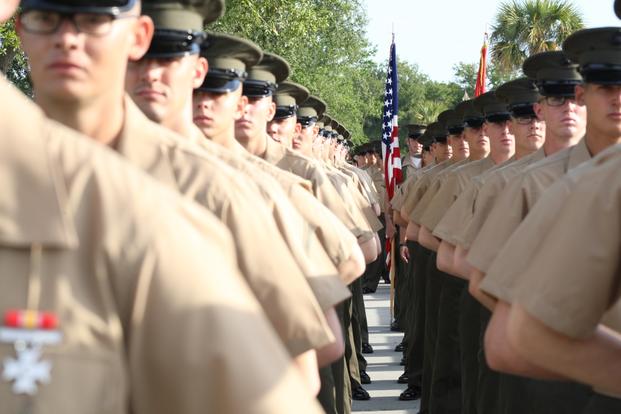The Marine Corps became the last service in the Defense Department to release a policy governing transgender troops this month, in preparation to comply with a Pentagon order that will allow transgender recruits to join the military by next July.
The six-page policy, signed by Lt. Gen. Mark Brilakis, deputy commandant for Marine Corps Manpower and Reserve Affairs, and released as a Marine Corps bulletin on Nov. 22, leaves a number of questions unanswered. In addition, key details, such as how to accommodate troops who are concerned about privacy, are left to unit commanders to handle.
The service also reserves the right to separate Marines whose ability to serve is adversely affected by medical conditions or medical treatment related to their gender identity, the policy states, adding that these Marines would be treated "in a manner consistent with a Marine whose ability to serve is similarly affected by medical condition(s) unrelated to gender identity or gender transition."
What constitutes an adverse impact on a Marine's ability to serve, however, is not detailed.
"For all of DoD, not just the Marine Corps, everyone's blazing a trail on this," said Maj. Garron Garn, a spokesman for the department. "A lot of scenarios are being discussed. It's so new and we're breaking ground."
He suggested that a Marine's inability to meet the height and weight or fitness standards of the gender to which he or she has transitioned would be cause for separation under the policy.
According to that policy, transgender Marines must meet all uniform, grooming, height, weight, and physical fitness standards appropriate to their preferred gender, and must comply with the same drug testing rules. Marines still in boot camp, officer candidates school, or primary job training may be separated if medical treatment associated with gender transition interferes with training, the policy states.
Marines who are unable to meet standards when transitioning can apply for an exception to policy, which would be adjudicated by the deputy commandant for M&RA on a case-by-case basis, according to the document.
The policy gives wide berth to unit commanders to find ways to provide appropriate privacy for Marines and sailors under their command. While the Navy addressed privacy and comfort concerns in its policy by requiring troops to maintain a basic level of modesty in berthing and shared bathroom and shower facilities, the Marine Corps gives commanders the option to spend money to modify base showers and bathrooms to "provide reasonable privacy." Commanders may also rearrange sleep and shower schedules to achieve "reasonable privacy in the accomplishment of all missions," the policy states.
How much money might be spent to build more private facilities and what the parameters are for these kinds of modifications are not detailed in the document.
"Each case is really going to be unique and individual and it's going to be case-by-case," Garn said.
On top of this, leaders of Marine Corps Installations and Logistics and Marine Corps Combat Development Command are tasked specifically with modifying shower facilities for the privacy of all recruits, officer candidates, and Marines, meaning that open shower bays at boot camp and other facilities could soon become a thing of the past for the service.
The Corps will take advantage of mobile training teams to educate commanders at installations, as it did with the integration of women into combat roles, according to the document. Garn said dates for these training sessions have not been set, but said the training will likely be complete by spring, ahead of the deadline to accept transgender recruits.
The Corps has received a small number of requests from transgender troops to begin the transition process, a step that requires a diagnosis from a military medical provider and approval from the chain of command, an official said. The service, however, is not releasing specific numbers of transition requests.
The issue of accommodating transgender troops has received direct attention from Marine Corps Commandant Gen. Robert Neller, Garn said.
"He and several key senior leaders are meeting in the coming weeks to talk about these scenarios with the intent of taking care of Marines," he said. "I have not heard from anywhere that Marines are pushing back against this. The decision has been made and the Marines will execute."
--Hope Hodge Seck can be reached at hope.seck@military.com. Follow her on Twitter at @HopeSeck.





























